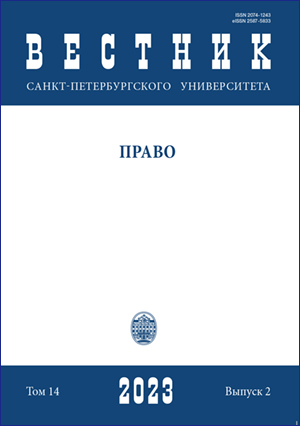National-legal and international-legal solutions to the problems of digitalization of transport engineering plants of Kazakhstan
DOI:
https://doi.org/10.21638/spbu14.2023.211Abstract
This article reveals one of the facets of a big topical topic formulated in the form of a radical transition of digitalization of transport engineering in Kazakhstan, to electric mobility, autopilot of its products, which should be disclosed through national and international legal decisions. This approach is expedient, because thanks to it, Kazakhstan’s transport engineering receives accelerated development. The purpose of this article is to conduct a systematic analysis of national and international legal problems of the transformation of today’s transport engineering into a digitalized one, in the production process of which various digital technologies, artificial intelligence technologies, robot manipulators at all production sites, automated mechanisms that allow the production of electric vehicles, autopilot-intelligent vehicles for various purposes will be involved. In this regard, researchers pay special attention to the legislative acts of the Republic of Kazakhstan, legislative acts of developed countries, as well as international conventions and agreements ratified and initiated by the Republic of Kazakhstan on the radical transition to a qualitatively new level of the above-mentioned branches of mechanical engineering, electric mobility and autopilot of transport vehicles produced by it. On this basis, the researchers in this article formulated legislative, organizational-legal, managerial- legal and practical proposals for the real provision of the radical transition of the studied branches of transport engineering through 5G technology. The authors use the method of comparative legal analysis of the legislation of different countries with the transport and production legislation of Kazakhstan. The method of scientific forecasting allows researchers to formulate new Kazakh laws and new international conventions relevant to the analyzed topic. The practical and theoretical significance of the study is related to the improvement of transport production and legal ways of digital export of products of Kazakhstani transport engineering enterprises on the basis of the World Trade Organization law.
Keywords:
digitalization, transport law, electric vehicle, unmanned vehicle, computer, artificial intelligence, robotics law
Downloads
References
Downloads
Published
How to Cite
Issue
Section
License
Articles of "Vestnik of Saint Petersburg University. Law" are open access distributed under the terms of the License Agreement with Saint Petersburg State University, which permits to the authors unrestricted distribution and self-archiving free of charge.






